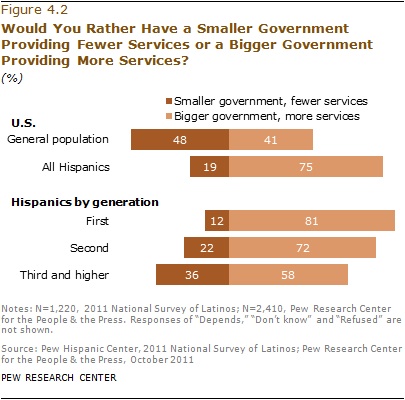01/28/2013
Blogger Mickey Kaus has a common-sensical list of simple questions about the upcoming amnesty legislation which is bearing down upon the nation. The points he brings up are part and parcel of the arguments against mass amnesty that restrictionists have been making for a long time, and are still true after all these years.
But the current environment is one of emotional panic on the part of the Republicans plus a push to act rapidly by the President before the craziness wears off. The Republicans have little interest in whether the amnesty will behave as promised; the nouveau border-blasters merely want it to be over and done with, even though an amnesty will hasten the decline of conservatism and the rule of law in this country.
If politicians cared about what the public wants, they might have noticed recent polls from Gallup and Pew showing that there is little interest in doing something about immigration compared with increasing jobs and cutting the deficit.
Hispanics will never become Republicans in substantial numbers, since Hispanics prefer big government (as shown by Pew research in the graph below) and their idea of family values includes a “generous safety net” from the unwilling taxpayers.

6 Simple Questions on Immigration, by Mickey Kaus, Daily Caller, January 27, 2013
To all my respectable friends: A big push for “comprehensive immigration reform’–meaning some combination of an amnesty plus some border-securing (“enforcement”) measures–begins this week. It will be portrayed in the MSM as a debate between rational bipartisan problem solvers and retrograde bigots. But it’s not that easy! Here are six questions to think about:
1. Why won’t this new reform be a repeat of the 1986 reform, when the amnesty provisions were implemented but the enforcement half was blocked by ACLU-style lawsuits and bureaucratic weakness? The result was a broken border and the approximately 11 million new unauthorized immigrants we’re talking about giving amnesty to today. (If it wouldn’t bother you if an Obama amnesty attracted millions of new unauthorized immigrants, then let’s be open about that.)
2. After this new reform is passed, some people will sneak into the country illegally. What happens to them? Won’t the same arguments–the need to bring people “out of the shadows,” the need not to offend Latino voters, etc.–produce yet another amnesty for them down the road? Don’t potential future border-crossers realize this?
3. What about the wages of unskilled workers? Unskilled workers have gotten the short end of the economy of recent decades. Many of the jobs they used to do are now done by cheaper workers overseas. Luckily there are still some unskilled jobs that have to be done in the U.S. Are we now importing desperate unskilled foreigners to do those jobs too? Doesn’t the law of supply and demand say this will drive wages for basic work down, at least a bit? Low-income workers are the people Democrats claim to care the most about. Will the immigration reform Dems champion force them to take yet another hit?
4. Are we really that good at assimilating? Yes, American culture is powerful. But now there is an entrenched lobby for bilingual education, and identity politics curricula that teach young people they’re right to resist assimilation. Formal and informal race preferences reward Americans for maintaining separate ethnic identities. And then there’s Univision, which would go out of business if too many people spoke the common language.
5. Isn’t Mexico special? Other immigrants had to cross oceans and cut ties to get here–and many still do. But half of our new unauthorized immigrants come from a single country a day’s drive away–a nation with a not-implausible claim to much of our Southwestern territory. The “border” may mean something else to them than it does to us, or to other immigrants. Everywhere else in the world this is a recipe for turmoil. Why are we immune?
6. Why not “Enforcement First … Amnesty Second”? Preventing unauthorized immigration–i.e. having a working border–isn’t easy. We’ve made strides, and immigration flows have slowed significantly. But we still have ways to go –only a minority of employers use the E-Verify system, for example–and we don’t know if the unauthorized flow will resume if the economy, particularly the construction industry, picks up. Why not wait and find out if enforcement measures (including any new ones that would be part of “comprehensive” reform) work–and then, if they do, go ahead give the undocumented the legal status that would ordinarily encourage more uncontrolled border-jumping?
It’s not like there won’t be political pressure for amnesty in the future.
This is a content archive of VDARE.com, which Letitia James forced off of the Internet using lawfare.